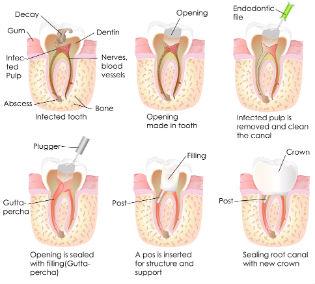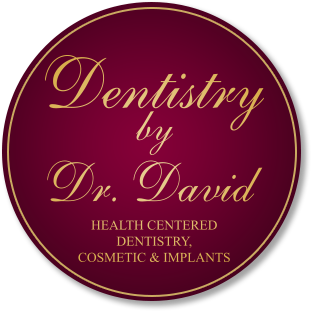Root
Canals
Dental Health and Root Canals
In the past, if you had a tooth with a diseased nerve, you would probably lose that tooth. Today, root canal treatments can save that tooth in one to three office visits.
Why are root canals necessary?
 When a tooth is cracked or has a deep cavity, bacteria can enter the pulp tissue and germs can cause an infection inside the tooth. Infected tissue causes pain and swelling. If left untreated, an abscess may form and the tooth might need to be removed as a last resort. The effects can injure your jawbones and negatively affect your overall health.
When a tooth is cracked or has a deep cavity, bacteria can enter the pulp tissue and germs can cause an infection inside the tooth. Infected tissue causes pain and swelling. If left untreated, an abscess may form and the tooth might need to be removed as a last resort. The effects can injure your jawbones and negatively affect your overall health.
What is the purpose of a root canal?
A root canal removes the infected nerve tissue.
A tooth’s nerve is not vitally important to a tooth’s health and function after the tooth has emerged through the gums. The nerve only allows you to feel hot or cold sensations. The presence or absence of a nerve will not affect day-to-day use of your tooth.
How do I know I need a root canal?
Teeth that require root canal therapy are not always painful. Other signs could include severe toothache, pain upon chewing or application of pressure, prolonged sensitivity or pain in response to hot and cold temperatures, a dark discoloration of the tooth, or swelling and tenderness in the nearby gums. If you experience any of these symptoms, contact your doctor.
What happens during a root canal?
During treatment, your general dentist or endodontist (a dentist who specializes in problems with the nerves of the teeth) removes the affected tissue. Ozone therapy can be used to disinfect roots after the nerves and blood vessels have been removed. Next, the interior of the tooth will be cleaned and sealed. Finally, the tooth is filled with a dental composite. If your tooth had extensive decay, your doctor may suggest placing a crown to strengthen and protect the tooth from breakage.
Now, our office has the most advanced way of performing laser-assisted root canals. Watch the video on the Sweeps procedure.
What happens after a root canal?
As long as you continue to care for your teeth and gums with regular brushing, flossing, and checkups, your restored tooth can last a lifetime.

Exceptional dental care is a lot closer than you think.
Located in Bolton at the intersection of 495 and Rt. 117, easily accessible from MetroWest Boston.
